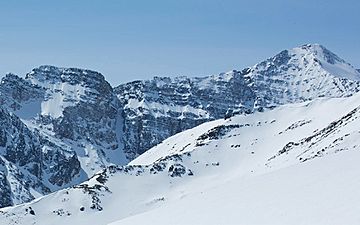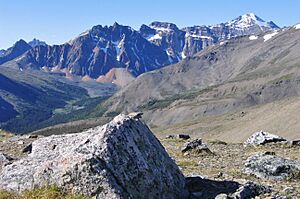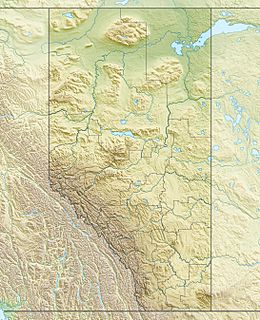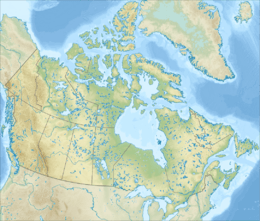Manx Peak facts for kids
Quick facts for kids Manx Peak |
|
|---|---|

Manx Peak seen from The Whistlers.
|
|
| Highest point | |
| Elevation | 3,044 m (9,987 ft) |
| Prominence | 374 m (1,227 ft) |
| Parent peak | Mount Estella (3069 m) |
| Listing | Mountains of Alberta |
| Geography | |
| Location | Jasper National Park Alberta, Canada |
| Parent range | Trident Range Canadian Rockies |
| Topo map | NTS 83D/16 |
| Climbing | |
| First ascent | 1919 R.T. Chamberlin, B. Herzberg |

Manx Peak is a tall mountain in Jasper National Park, Alberta, Canada. It stands 3,044-metre (9,987 ft) high in the Canadian Rockies. The peak is part of the Trident Range. It's about 14 kilometres (8.7 mi) from the town of Jasper.
Manx Peak is a mountain summit, which means it's the highest point of the mountain. It is found in Jasper National Park, in the Trident Range of the Canadian Rockies in Alberta, Canada. The town of Jasper is about 14 kilometres (8.7 mi) to the north.
Circus Valley is located on the south side of the mountain. The northeast side of the mountain rises high above the valley of Whistlers Creek. The closest higher peak is Mount Estella, which is 1.8 km (1.1 mi) to the southwest. Terminal Mountain is 2.0 km (1.2 mi) to the east.
The mountain is made of sedimentary rock. This rock formed from layers of sand, mud, and other materials over millions of years. These layers were laid down from the Precambrian to the Jurassic periods. Later, during an event called the Laramide orogeny, these rocks were pushed up and over younger rocks.
History of Manx Peak
The peak was given its name in 1916 by Morrison P. Bridgland. He named it because the shape of the mountain's contours looks like a triskelion. A triskelion is a symbol with three legs, like the one on the flag of the Isle of Man. The Isle of Man is the home of the Manx people.
Morrison P. Bridgland (1878–1948) was a Dominion Land Surveyor. This means he was a government surveyor who mapped out land. He named many peaks in Jasper Park and the Canadian Rockies.
The first ascent of Manx Peak was made in 1919. It was climbed by R.T. Chamberlin and B. Herzberg. The mountain's name was officially accepted in 1951 by the Geographical Names Board of Canada. This board is responsible for naming places in Canada.
Climate Around Manx Peak
Manx Peak is in a subarctic climate zone. This type of climate has cold, snowy winters and mild summers. Temperatures can drop below −20 °C (−4 °F) (which is −4 °F (−20 °C)). With wind chill, it can feel even colder, below −30 °C (−22 °F) (which is −22 °F (−30 °C)).
Any rain or melting snow from Manx Peak flows into the Athabasca River. This is called precipitation runoff.
 | Delilah Pierce |
 | Gordon Parks |
 | Augusta Savage |
 | Charles Ethan Porter |



